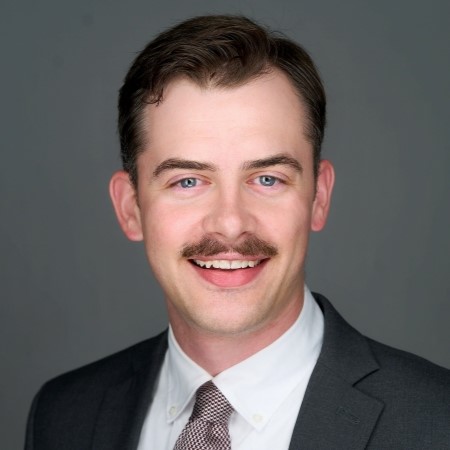From Soldier to Strategist: Veteran Expands Red Cross Reach Internationally

Meet Daily Point of Light Award honoree Nickolas Nevius. Read his story, and nominate an outstanding volunteer or family as a Daily Point of Light.
For 29-year-old Nickolas Nevius, service has always been a through-line—first as an Army officer, and now as a dedicated volunteer leader with the American Red Cross. Based in South Korea, Nickolas devotes his time to strengthening Red Cross programs that support military communities across the Asia-Pacific region.
After leaving the Army last year, Nickolas joined the Red Cross, first helping spearhead the Red Cross-Department of Defense (DoD) SkillBridge Program, a national initiative that connects service members transitioning out of the military with civilian career opportunities. Today, as a leadership partner for the Red Cross Asia-Pacific Division, he works strategically to expand resources for U.S. forces stationed from Australia to Singapore. His work helps ensure that American personnel and their families have access to Red Cross services wherever they serve.
A veteran, military spouse and graduate student in health policy and management at the University of California, Berkeley, Nickolas balances his studies in health policy and management with 15–20 hours of volunteer service each month. His blend of lived experience and strategic vision continues to shape how the Red Cross supports those who serve.
What inspires you to volunteer?
I think it’s really rooted in my educational experiences growing up. I went to Catholic school for quite some time, and service was built into the curriculum. While I’m no longer in that faith tradition, that desire to improve your community through service still carries through to today.

Tell us about your volunteer role with the Red Cross.
I’m a leadership partner for the Red Cross Asia-Pacific Division director. The Red Cross runs on volunteers. There’s a very small full-time staff, so volunteers play a huge part in how the organization operates.
My role functions like a strategic operations associate. We’ve been focused on two major initiatives. The first is developing a Western Pacific strategy—analyzing where U.S. forces are stationed and making sure Red Cross resources are aligned to support those locations. The second is drafting a memorandum of agreement between the Red Cross and U.S. Army Pacific that outlines how both organizations would work together during a natural disaster or potential conflict, ensuring everyone affiliated with the U.S. military and allied powers can be evacuated safely off the peninsula if a crisis ever breaks out.
You also helped launch the Red Cross-DoD SkillBridge Program. Why was that important to you?
I went through SkillBridge myself when I was transitioning out of the Army. My experience was positive, but I saw room for improvement—mainly in making sure participants actually had full-time opportunities afterward.
So when I had the chance to work at Red Cross National Headquarters, I wanted to shape the program to ensure meaningful employment outcomes for transitioning service members. Although changes to the Department of Defense’s legal framework eventually paused the program, my intent was always to improve the process and outcomes for those making that transition.
Is there a moment that stands out as particularly rewarding?
Yes. There was an Army officer at Fort Sill who was transitioning out and wanted to work with the Red Cross. We helped him navigate several moving parts—relocation, career goals—and ultimately placed him in a full-time role in disaster cycle services.
He’d spent over 20 years deploying around the world, ensuring others’ safety and this position let him focus on helping people here at home. Seeing that come together was really gratifying.
How has your military experience influenced your approach to volunteering?
Service to the Armed Forces is laser-focused on giving back to military communities. Having been an Army officer myself, I understand the landscape—the needs, the gaps and where the Red Cross can step in to help. That background has been essential to doing this work effectively.
What motivated you to keep volunteering, even while pursuing graduate studies?
I think it’s really important to get involved in your community, especially when you have the capacity to do so. I’m very blessed to be in a position where I can volunteer at the strategic level and have an outsized impact. The Red Cross gives me flexibility to balance my coursework with this work, and I find it incredibly meaningful.
Why do you think volunteering is important?
If you’re fortunate enough to be able to dedicate time, talent or treasure to an organization, you should. Time, especially, is such a precious resource, but it’s absolutely worthwhile to spend it on a cause you’re passionate about.
The world would probably be a better place if everyone devoted even a little time to something they cared about.
What advice would you give to someone who wants to start volunteering?
Just get out there and do it. It’s really wonderful for community building. Volunteering connects you with people you might never meet otherwise, and that’s an important part of what makes it fulfilling.
What do you hope people take away from your story?
I hope they realize that even with busy lives, you can make time to do meaningful work. There are so many opportunities out there. You just have to apply and see what happens. You might find a wonderful community waiting for you.
Do you want to make a difference in your community like Nickolas? Find local volunteer opportunities.